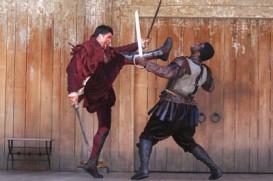Coriolanus - Shakespeare's Globe 2006
This production is a 'first' in two senses. It's not only the first production in this year's season at Shakespeare's Globe Theatre at Bankside, but it's also the first production from Dominic Dromgoole who's taken over as Artistic Director at the Globe. He's opted for a season entitled 'The Edges of Rome' which includes (among others) 'Titus Andronicus', 'Anthony and Cleopatra' and 'Comedy of Errors'.
Probably written around 1608 and set in the early Roman republic of 500 BC, 'Coriolanus' is produced far too infrequently for my liking because it's one of Shakespeare's more interesting political plays that has considerable modern relevance and can still teach us a thing or two about the nature of politics and humility. Based on class conflict, it's almost the ideal play for the unique and special setting which the Globe affords.
The 'star' of this play is Caius Martius, a human fighting machine and arrogant brute who delights in little else than being in the midst of a bloody battle. But then he's had a good mentor: his mother, Volumnia, or the 'honour'd mould wherein this trunk was fram'd' as Coriolanus calls her. She's pressured and cajoled her son into being a warrior from a tender age, and rejoices in her son's glories in battle, as well as the wounds he acquires along the way - not exactly what one might regard as typical maternal instinct! With a mother who's driven by bloodthirsty ambition (and thus represents the state of Rome itself), it's no wonder that Coriolanus lacks a gentler or 'feminine' side to his character, as one might say. Certainly he could do with learning a few manners, and a considerable amount of humility as well as diplomacy, but it's pretty clear from the start that Caius Martius isn't going to learn very much, if anything, during the course of this play.
Naturally enough, when the Romans are up against some agro from niggling neighbours the Volscians, Caius Martius is called into battle and duly makes mincemeat of the foe, almost single-handedly capturing one of their cities. As recognition for his achievements and saving the Romans' bacon, he's given the name 'Coriolanus' and nominated for election as Consul. The only hitch is that to acquire the prestigious post, Coriolanus must get the consent of the 'plebs' - the common people if you like - and this proves a stumbling block to Coriolanus's ambition as well as the security of Rome, because Coriolanus hates the plebs, describing them later in the play as a 'common cry of curs' - not the kind of diplomacy to win any favours, or votes for that matter. But the plebs are also manipulated by two Machiavellian Tribunes who have recently been elected to represent them in the senate. And they hate Coriolanus too. So they stir up the easily swayed rabble, Coriolanus is denounced as a traitor and gets banished. Turning against Rome, the once-vaunted exile joins forces with the Volscians, throwing the Romans into turmoil and panic, and forcing Rome's ruling class to do a bit of persuasive grovelling and arm-twisting to stop Coriolanus sacking Rome and butchering all its citizens.
Dominic Dromgoole has quickly got to grips with the Globe's unique space, which affords both wonderful opportunities as well as immense challenges in terms of staging. Mike Britton's design neatly incorporates two extended walkways built out from the enormous stage right into the heart of the audience, bringing spectators into the thick of the action and part of the plebeian crowd. And when Coriolanus meets his demise, he does so in a spectacular and unexpected way, resulting in gasps and shrieks from the stunned audience, but again demonstrating that Dromgoole is going to milk his new found arena in interesting and imaginative ways.
I don't think I've seen a production of Coriolanus with quite so much humour. But it's not forced or artificial in any way. Indeed, once Dromgoole made it clear to us that we were 'allowed' to laugh, there were times when the audience saw humour where it wasn't at all obvious, but yet they spotted it. That's a significant tribute to Dromgoole's production. But it's a tribute to Shakespeare too, because his humour is often more subtle than one might think, yet it's still clearly recognised by modern audiences, and one of the reasons why his work endures.
I'm not sure there is a more appropriate venue for this play. So, if you've never been to the Globe before, don't miss this opportunity to see a stimulating and witty version of one of Shakespeare's rarely produced plays, in a superb setting. It certainly whets the appetite for what looks like being an intriguing and highly enjoyable season.
What the popular press had to say.....
NICHOLAS DE JONGH for THE EVENING STANDARD says, "Dromgoole's production, with its lumbering airs and few graces, never captures the sense of tension." ALASTAIR MACAULAY for THE FINANCIAL TIMES says, "Dromgoole does not lack nerve. He has just begun his Globe regime with Coriolanus...If Dromgoole can build from this promising start, the best years at Shakespeare's Globe lie ahead." MICHAEL BILLINGTON for THE GUARDIAN says, "This is a clear-spoken, intelligent production that suggests the Globe is starting to shed its image of whimsical eccentricity." CHARLES SPENCER for THE DAILY TELEGRAPH says, "Highly enjoyable ." BENEDICT NIGHTINGALE for THE TIMES says, "It's not the most exciting Coriolanus I've seen, but it's lucid, intelligent and always absorbing." KATE BASSETT for THE INDEPENDENT says, "Enjoyable and refreshing."
External links to full reviews from popular press
The Guardian
The Independent
Financial Times
Daily Telegraph
The Times
Production photos by John Haynes
Originally published on
